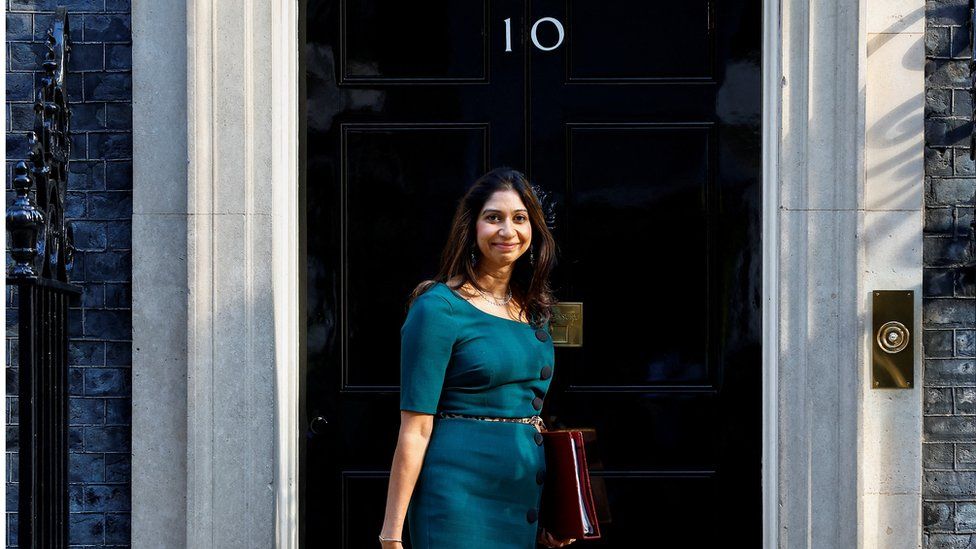
By Kate Whannel
Political reporter, BBC News
Home Secretary Suella Braverman has defended the prime minister’s approach to green policies as “pragmatic” after it appears he is set to weaken some green commitments.
The plans could include delaying a ban on the sales of new petrol and diesel cars from 2030 to 2035.
The news has sparked anger among the car industry, opposition MPs and some Conservatives.
The BBC has been told that Labour would reinstate any car 2030 ban, if elected.
Ms Braverman said the government could not tackle climate change by “bankrupting the British people”.
As part of climate change obligations, the UK has said it will reach net zero carbon emissions by 2050 – meaning the country aims to take out of the atmosphere as many greenhouse gas emissions – such as carbon dioxide – as it puts in.
Speaking to BBC Breakfast, Ms Braverman said the government remained “absolutely committed” to the 2050 target but that it should be delivered in a “sustainable way that doesn’t impose undue and disproportionate costs”.
The prime minister’s announcement, detailing a shift in approach, is expected this week, and could come as early as today.
In addition to postponing the petrol and diesel car ban from 2030 to 2035, other potential policy shifts could include:
- easing the reductions of gas boilers – with only 80% to be phased out by 2035
- no new energy efficiency regulations on homes for landlords and homeowners
- a delay to the ban on off-grid boilers from 2026 to 2035, with an aim of 80% being phased out by that date
- no new taxes to discourage flying, no government policies to change people’s diets and no measures to encourage carpooling.
Mr Sunak is also likely to rule out what he sees as burdensome recycling schemes.
Conservative MP Sir Alok Sharma – who led the international climate conference in Glasgow in 2022 – expressed concern about the changes, saying: “Frankly the last thing the business community wants is chopping and changing of policies.
“This also says something about a political party’s approach to its values – do we want to leave the world in a better place for future generations?”
Sir Alok questioned whether the shift would be popular with voters, but Downing Street is hoping it will provide a clear dividing line between Labour and the Conservatives.
Labour has promised to invest £28bn a year in green industries until 2030 – although earlier this year it slightly watered down this pledge – saying the investment would be ramped up over time.
Darren Jones, Labour’s shadow chief secretary to the Treasury, said retreating from green commitments would damage the economy.
Appearing on BBC Breakfast, he would not say whether Labour would reinstate green targets if they are removed by Rishi Sunak.
There were concerns in the party that reinstating the target in such quick succession would only cause further confusion for businesses.
But it is understood that after private conversations with the car industry Labour now believe the sector wants to stick with the 2030 target anyway.
The car industry has reacted angrily to the news on petrol and diesel cars.
Ford’s UK chair Lisa Brankin said: “Our business needs three things from the UK government, ambition, commitment, and consistency… a relaxation of 2030 would undermine all three.”
Mike Hawes, head of the Society of Motor Manufacturers and Traders, said the potential delay to banning the sale of new petrol and diesel cars was “a bit of a concern”.
“The view of the industry is we are on track for ending fossil fuels vehicles – it is not for turning back and the UK should be leading it both as an industry and a market.”
Conservative MP Chris Skidmore, the former chairman of the UK government’s net zero review, said the prime minister risked making “the greatest mistake of his premiership” and warned that diluting green policies could see the UK missing out on “growth, jobs and future prosperity”.
However, others in the party have welcomed the move. Craig Mackinlay, who leads the net zero scrutiny group, said the current deadlines were “clearly unachievable”.
According to surveys by YouGov, over the past few years around 15-25% of Conservative voters have considered the environment to be the most important issue facing the country.








